 |
|
|
 |
 |
 |
 |
| ALL STATEMENTS ABOUT : |
| Promote International Security |
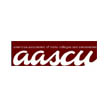 |
AASCU
American Association of State Colleges and Universities
Profile >
|
“While the events of September 11 have underscored the need for strong homeland security and national defense, they have also powerfully reminded the nation of its inextricable relationships with the world community, as well as the vital importance of better awareness and understanding of its global neighbors. AASCU strongly believes that higher education institutions, as primary agents of intellectual and cultural exchange, must maintain and enhance their international outlook in the world that is emerging.”
Full Statement >
|
|
 |
Albright, Madeleine K.
Former Secretary of State
Department of State
Profile >
|
“…people who understand and know each other better are less likely to hate and attack each other. And that requires a certain faith in human character, a faith without which no human progress could be achieved. “
Full Statement >
|
|
 |
Alliance
Alliance for International Education and Cultural Exchange
Profile >
|
“NAFSA and the Alliance have long maintained that international education and exchange are critical components of U.S. national security and foreign policy. As the United States seeks to fashion its response to the tragic events of September 11, this type of engagement with the world is even more important.”
(Joint statement with NAFSA)
Full Statement >
“The world is coming to us, like it or not. Immigrants are changing the face of American
society. Foreign-born experts pace America.s scientific leadership. The American
workforce is now multicultural, and customers for American products are found
everywhere the Internet goes. These realities help fuel U.S. development, but they also
create new needs, both for managers who can think globally and for tolerance and cross-
cultural sensitivity in our neighborhoods and workplaces.”
“In short, international and cross-cultural awareness and understanding on the part of U.S.
citizens will be crucial to effective U.S. leadership, competitiveness, prosperity, and
national security in the next century. Yet..all the laws on the books notwithstanding..
the United States effectively lacks a coherent, coordinated, operational policy for
educating its citizens internationally.”
“The millions of people who have studied in the United States over the years constitute
a remarkable reservoir of goodwill for our country, perhaps our most underrated
foreign policy asset. To educate international students is to have an opportunity to
shape the future leaders who will guide the political and economic development of
their countries. Such students gain an in-depth exposure to American values and to
our successful multicultural democracy, and they take those values back home to
support democracy and market economies.”
“If American students are to be able to function effectively in the world into which
they will graduate, it must become the routine.not the exception.for them to study
abroad in high quality programs. For that to happen, the United States requires a
policy to promote global learning.a policy that recognizes that providing Americans
with opportunities to acquire the skills, attitudes, and perceptions that allow them to
be globally and cross-culturally competent is central to U.S. security and economic
interests in the twenty-first century.”
“Exchange programs uniquely engage our citizenry in the pursuit of our country.s global interests, and offer opportunities for substantive interaction in the broadest possible range of fields. These exchanges also offer unparalleled opportunities for intercultural learning. Many of today.s world leaders first experienced America and its values through exchange programs. But these valuable programs are hemmed in by diminished policy priority and by bureaucratically imposed regulations that make them more
difficult than necessary for nongovernmental and community organizations to manage.”
(Joint statement with NAFSA)
Full Statement >
|
|
 |
Annan, Kofi
U.N. Secretary-General
United Nations
Profile >
|
"We in the United Nations have learned, from our experience of rebuilding war-torn societies, that the seeds of conflict often lie in uneven and unequal development and opportunity."
"The United Nations itself was founded in the belief that dialogue can triumph over discord, that diversity is a gift to be celebrated, and that the world's peoples are united by their common humanity far more than they are divided by their separate identities. Dialogue can prevail over violence, understanding over indifference, knowledge over ignorance and prejudice. Those must be the goals of the United Nations as we work to bridge the divide among peoples and cultures. Indeed, in proclaiming 2001 the United Nations Year of Dialogue among Civilizations, the General Assembly helped to heighten public awareness of the need to search for understanding and harmony among peoples."
"Today, we know that just as no nation is immune to conflict or suffering, no nation can defend itself alone. We need each other -- as friends, as allies, as partners -- in a struggle for common values and common needs."
Full Statement >
|
|
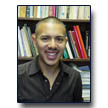 |
Ayala, Jesus
BA in Political Science and American Studies, minor in Ethnic Studies
University of California, Berkley
Profile >
|
“As I look back at the terrorist attacks on the World Trade Center, I realize that my time abroad gave me the skills that have allowed me to better understand the way in which terrorism challenges international security. In Israel I was forced to be aware of my surroundings at all times, and now that terrorism is closer to home, I do not want fear to take control of my life. Waging a war on terrorism, though, is not enough. In some countries like Israel and Colombia, for example, everyday is September 11th. The challenge is finding a solution; a good first step is learning about others. Now more than ever as U.S. citizens we need to know what is happening outside our nation’s borders and must be capable of working and understanding people from diverse backgrounds.”
Full Statement >
|
|
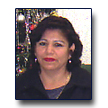 |
Ayala, Ofelia
Parent of study abroad student
Profile >
|
“In light of the events of September 11th safety is a huge concern among parents. Now I worry about my children’s well being more than ever. But, the terrorist attacks on the World Trade Center have taught us all that on September 11, 2001 any country in the world was safer than the United States. As Americans we are all learning to be more alert and prepared. Part of being prepared is continuing on with our lives and hoping for the best.”
Full Statement >
|
|
 |
Becraft, Michael
Former Acting Deputy Commissioner
Immigration and Naturalization Service
Profile >
|
“It has been said that after September 11 "everything has changed.." I hope that is not true.
America must remain America, a symbol of freedom and a beacon of hope to those who seek a better life for themselves and their children. We must increase our security and improve our systems, but in doing so we must not forget what has made this nation great _ our openness to new ideas and new people, and a commitment to individual freedom, shared values, innovation, and the free market. This includes providing international educational opportunities that benefit both the United States and the many nations around the world that send their young people here to learn.”
Full Statement >
|
|
 |
Beers, Charlotte
Former Under Secretary of State for Public Diplomacy & Public Affairs
House International Relations Committee
Profile >
|
“…It's significant I think that 50 of the world leaders with whom we are trying to develop a coalition have been members of and participated in our exchanges over the long number of years that you supported them and we have been able to field them. This kind of liaison experience and dialogue that we set up so long ago is not only going to help us build a coalition but sustain it."
Full Statement >
"Fulbright academic exchanges and other professional exchanges must continue. We are using the contacts we earned over the years with exchanges and scholarships to develop a whole new level of diploma and speaking between moderate Muslims and the United States… We have to be mindful that we are in a long- lived engagement to reach new audiences in different ways."
Full Statement >
|
|
 |
Bush, George W.
Former U.S. President
United States
Profile >
|
"America's leadership and national security rest on our commitment to educate and prepare our youth for active engagement in the international community."
"The relationships that are formed between individuals from different countries, as part of international education programs and exchanges, can also foster goodwill that develops into vibrant, mutually beneficial partnerships among nations."
"…trust, unity, and peace between nations are built on understanding, and that real understanding comes from communication."
Full Statement >
|
|
 |
Clinton, Hillary Rodham
Current U.S. Secretary of State
United States
Profile >
|
"Always, and especially in the crucible of these global challenges, our overriding duty is to protect and advance America’s security, interests, and values: First, we must keep our people, our nation, and our allies secure. Second, we must promote economic growth and shared prosperity at home and abroad. Finally, we must strengthen America’s position of global leadership – ensuring that we remain a positive force in the world, whether in working to preserve the health of our planet or expanding dignity and opportunity for people on the margins whose progress and prosperity will add to our own."
Full Statement >
|
|
 |
FitzSimons, Katherine C.
Graduate Student, B.A. Spanish, Journalism
University of Southern California
Profile >
|
"After September 11, I was better able to sympathize with the victims of ETA’s attacks, and I came to understand that the U.S. has a lot more in common with Spain than I once thought. My experience abroad in the Basque country helped me to realize that security and terrorism are international issues that affect the lives of not just Basques, Spaniards and Americans, but those in all other countries."
Full Statement >
|
|
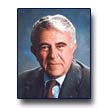 |
Gilman, Benjamin (R-NY)
Former Congressman
Congress
Profile >
|
“In my years of experience with our nation's foreign policy, I see that the most enduring influence is achieved through our international exchange programs. People-to-people contact - the seeing, doing and interacting - is how we learn to appreciate similarities, differences or other ways of doing things. Exchanges provide forums for new ideas, training opportunities and the chance to build support networks. Professionals, high school students, academics or mid-level government officials all benefit from the experience of interacting with their international counterparts. This exposure to a world outside of one's home country leads to greater understanding, which is particularly important for the emerging democracies where people are looking for a lifeline to secure reforms and freedoms.”
Full Statement >
|
|
 |
Goodman, Allan E.
President and CEO
Institute of International Education
Profile >
|
"Aside from the economic benefits of international education, what we do together contributes directly to making the world safer and more secure."
Full Statement >
"…educational exchange contributes directly to making the world safer and more secure. An educational experience in America, moreover, pays dividends to the nation's public diplomacy over many years. More than 50 of the world leaders called by Former President Bush and Former Secretary Powell to join the coalition fighting terrorism studied in the United States or came to America early in their careers as part of the International Visitors Program which we also assist the Department in administering."
"U.S. leadership in support of international education remains central to the kind of world in which we are going to live. A few weeks after the awful events of September 11th, I had a visit from the director of the ministry of education and research of Germany. We spoke at some length about the need to keep the educational doors of both of our countries as open as possible. After our discussion he wrote that 'We learnt from the United States how enriching it is to win the interest and support of the brightest minds from all over the world and we trust in your country to remain as open as it has been in the past. If you closed your borders again … you would set a model that others would follow all too soon.'"
Full Statement >
"When more Americans have the chance to study in other countries, they will have an opportunity to share American values and aspirations while gaining an appreciation of different cultures and learning about the many different ways people see us and the world. Understanding of and knowledge about the culture and society of others is critical to the success of American diplomacy and business, and the lasting ties that Americans make during their sojourns abroad are important to our country in times of conflict as well as in times of peace."
(Joint statement with Henry Kaufman)
"We have received messages of support from people all over the world who have studied in the United States. Students and alumni of every nationality and religious and political background have voiced their hope, as one student said, that programs of exchange may help us to 'stand together in solidarity with the voice of reason and work together to spread peace.'"
(Joint statement with Henry Kaufman)
"Educational exchange helps make the world safer and more secure."
(Joint statement with Henry Kaufman)
Full Statement >
“Programs that promote the international exchange of people and ideas are the intellectual power lines and thoroughfares of the future. In my view, they are also the surest way of making the world a less dangerous place.”
Full Statement >
"The exchange of knowledge and ideas between American citizens and the people of other nations is vital to American higher education and to the prospect of creating a peaceful, more secure world."
Full Statement >
|
|
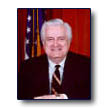 |
Hyde, Henry (R-IL)
Former Chairman
House International Committee
Profile >
|
"If we are to be successful in our broader foreign policy goals, America's effort to engage the peoples of the world must assume a more prominent place in the planning and execution of our foreign policy…The task of countering misinformation and propaganda regarding the United States is a never-ending one, but we must go about this task more aggressively and more systematically, rather than simply reacting to crises as they occur."
"Public diplomacy - which consists of systematic efforts to communicate not with foreign governments but with the people themselves - has a central role to play in the task of making the world safer for the just interests of the United States, its citizens, and its allies."
Full Statement >
|
|
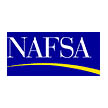 |
Johnson, Victor C.
Associate Executive Director of Public Policy
NAFSA
Profile >
|
"…in today's world, no one can be considered educated who is not educated internationally. The events of September 11 emphasize what we have known for some time: that U.S. leadership, security, and economic competitiveness are linked to events in the world and increasingly depend on a globally literate U.S. citizenry."
Full Statement >
|
|
 |
Joyce M. Randolph
Executive Director
University of Pennsylvania, Office of International Programs
Profile >
|
“Today, we must not be paralyzed, either physically or mentally. Not only must daily
routines be taken up again, but we should also unlock our thinking—to realize that, now more than
ever, it is important, indeed essential, to remain open to the world. Americans and citizens of other
countries would be foolish and unrealistic not to remain ‘on alert.’ But, in the long run, to reach the goals of security and peace and prosperity, an absolutely essential factor is increased international understanding, greater tolerance for other cultures and beliefs, and enhanced familiarity with people who may initially seem uncomfortably foreign.”
Full Statement >
|
|
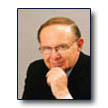 |
Kaufman, Henry
Former Chairman of the Board of Trustees
Institute of International Education
Profile >
|
"When more Americans have the chance to study in other countries, they will have an opportunity to share American values and aspirations while gaining an appreciation of different cultures and learning about the many different ways people see us and the world. Understanding of and knowledge about the culture and society of others is critical to the success of American diplomacy and business, and the lasting ties that Americans make during their sojourns abroad are important to our country in times of conflict as well as in times of peace."
(Joint statement with Allan E. Goodman)
"We have received messages of support from people all over the world who have studied in the United States. Students and alumni of every nationality and religious and political background have voiced their hope, as one student said, that programs of exchange may help us to 'stand together in solidarity with the voice of reason and work together to spread peace.'"
(Joint statement with Allan E. Goodman)
"Educational exchange helps make the world safer and more secure."
(Joint statement with Allan E. Goodman)
Full Statement >
|
|
 |
Ki-Moon, Ban
Current U.N. Secretary-General
United Nations
Profile >
|
“I continue to work to strengthen the UN's ability to carry out conflict prevention, peacemaking, peacekeeping and peacebuilding. By enhancing our capacity for preventive diplomacy and supporting sustainable peace processes, we will build long-term solutions and respond more effectively to conflict.”
Full Statement >
|
|
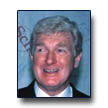 |
Moran, James P.
Congressman
Congress
Profile >
|
“These programs help to export American ideals. Ideals of democracy, human rights, good governance, freedom of speech and religion, personal responsibility, accountability, and the rule of law. In the aftermath of September 11th, hopefully, we as a nation, have come to the realization that we must be ever more resolute in promoting these ideals abroad.”
Full Statement >
|
|
 |
Mossbarger, Miriam
Undergraduate Student, International Relations, minor Graphic Arts
University of Southern California
Profile >
|
Not only did I intermingle with and befriend English, Welsh and Scottish students, but because the University I attended was well-known throughout Europe and in other parts of the world, I had a chance to meet people from Denmark, Pakistan, Germany, France, Canada, Spain, and of course the United States. Each conversation with these people opened my mind a little more to a world larger and more complete than what I had known before my time abroad, and each conversation challenged my views – forced me to assess and re-evaluate the views I held. But despite the many, and often aggravating differences in opinion I encountered, I was continually reassured by our ability to listen, for the most part, with open and willing minds and address through debate and questioning some common concerns and issues. It gave me hope for the success of future world leaders and peoples who already strive to solve the problems that plague our international system.
Full Statement >
|
|
 |
NAFSA
Association of International Educators
Profile >
|
“NAFSA and the Alliance have long maintained that international education and exchange are critical components of U.S. national security and foreign policy. As the United States seeks to fashion its response to the tragic events of September 11, this type of engagement with the world is even more important.”
(Joint statement with Alliance)
Full Statement >
“The world is coming to us, like it or not. Immigrants are changing the face of American
society. Foreign-born experts pace America.s scientific leadership. The American
workforce is now multicultural, and customers for American products are found
everywhere the Internet goes. These realities help fuel U.S. development, but they also
create new needs, both for managers who can think globally and for tolerance and cross-
cultural sensitivity in our neighborhoods and workplaces.”
“In short, international and cross-cultural awareness and understanding on the part of U.S.
citizens will be crucial to effective U.S. leadership, competitiveness, prosperity, and
national security in the next century. Yet..all the laws on the books notwithstanding..
the United States effectively lacks a coherent, coordinated, operational policy for
educating its citizens internationally.”
“The millions of people who have studied in the United States over the years constitute
a remarkable reservoir of goodwill for our country, perhaps our most underrated
foreign policy asset. To educate international students is to have an opportunity to
shape the future leaders who will guide the political and economic development of
their countries. Such students gain an in-depth exposure to American values and to
our successful multicultural democracy, and they take those values back home to
support democracy and market economies.”
“If American students are to be able to function effectively in the world into which
they will graduate, it must become the routine.not the exception.for them to study
abroad in high quality programs. For that to happen, the United States requires a
policy to promote global learning.a policy that recognizes that providing Americans
with opportunities to acquire the skills, attitudes, and perceptions that allow them to
be globally and cross-culturally competent is central to U.S. security and economic
interests in the twenty-first century.”
“Exchange programs uniquely engage our citizenry in the pursuit of our country.s global interests, and offer opportunities for substantive interaction in the broadest possible range of fields. These exchanges also offer unparalleled opportunities for intercultural learning. Many of today.s world leaders first experienced America and its values through exchange programs. But these valuable programs are hemmed in by diminished policy priority and by bureaucratically imposed regulations that make them more
difficult than necessary for nongovernmental and community organizations to manage.”
(Joint statement with Alliance)
Full Statement >
|
|
 |
Paige, Rod
Former U.S. Secretary of Education
Department of Education
Profile >
|
"For our nation to continue to engage other nations effectively, we need to give our students at all levels an international education that meets the highest standards."
Full Statement >
|
|
 |
Powell, Colin L.
Former U.S. Secretary of State
Department of State
Profile >
|
"International education prepares our citizens to live, work, and compete in the global economy, and promotes tolerance and the reduction of conflict."
"I can think of no more valuable asset to our country than the friendship of future world leaders who have been educated here."
Full Statement >
“American values, including democracy, economic freedom and individual rights, draw students from many nations. As these students and scholars from other countries gain from our society and academic institutions, they also serve as resources for our campuses and our communities, helping our citizens to develop the international understanding needed to strengthen our long-term national security and enhance our economic competitiveness. The professional partnerships and lifelong friendships that are created through international education are important for a secure, prosperous future not only for our own country but for the world as a whole.”
Full Statement >
|
|
 |
Riley, Richard W.
Former U.S. Secretary of Education
Department of Education
Profile >
|
“I strongly believe that the growth of democracy, economic prosperity and economic stability throughout the world is linked to the advance of education. This is one of the strongest reasons why the United States should have an active and strong international education agenda. Education and democracy go hand in hand.
As a great democracy, the United States has a vested interest in promoting democracy and economic stability throughout the world. When we help democracy and economic prosperity in the rest of the world, we are also helping ourselves beyond the fact that it is right thing to do.
All throughout the world there are thousands of leaders in other nations-political, economic and social leaders-who got a taste of democracy in all of its complexity when they came to study here in the United States. They saw America, in all our goodness and in some of our excesses, too.”
Full Statement >
|
|
|
 |
|
|
|
 |
|
|
 |